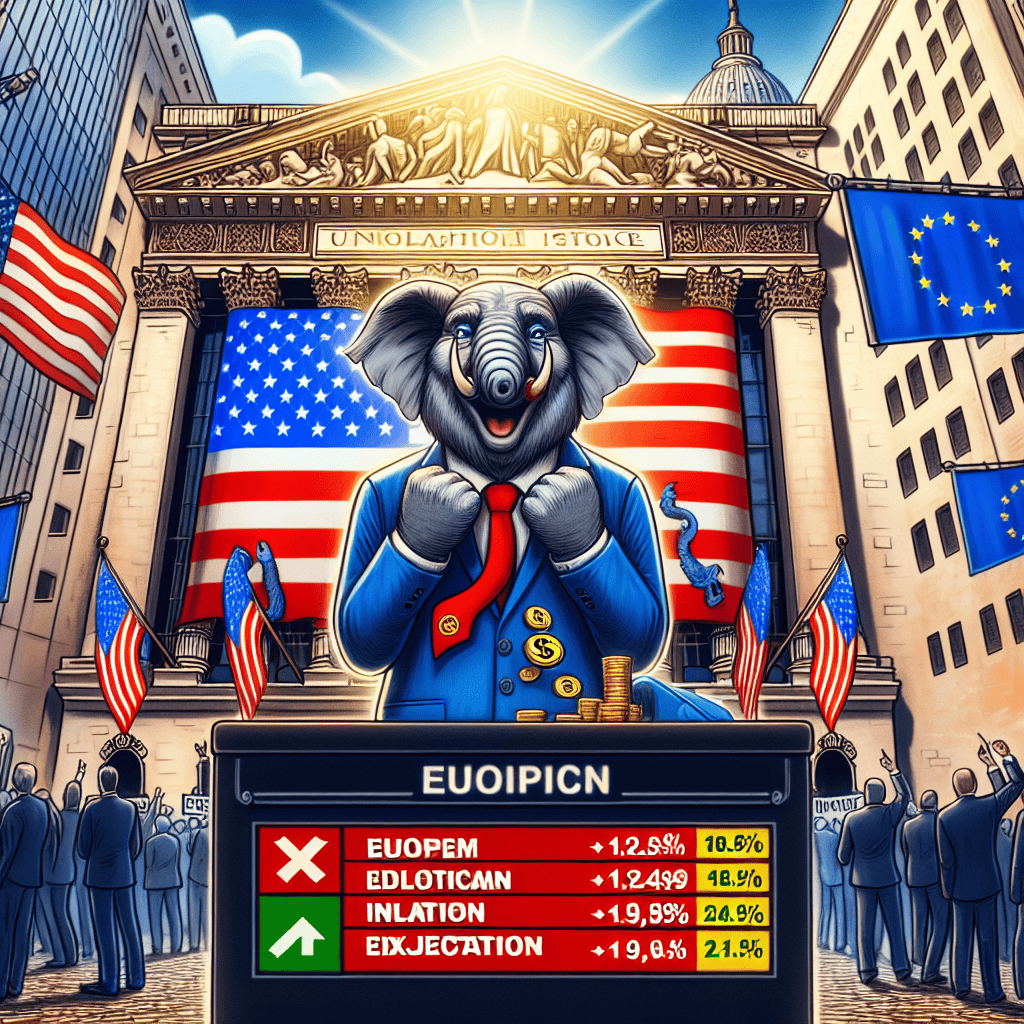“Markets Brace for Change: European Stocks and Inflation Signal Trump Victory Anticipation”
Introduction
In the lead-up to the upcoming U.S. presidential election, financial markets are abuzz with speculation and strategic positioning, as Wall Street increasingly anticipates a potential victory for Donald Trump. This sentiment is mirrored across the Atlantic, where European stocks and inflation markets are beginning to reflect these expectations. Investors are closely monitoring the implications of a Trump win, which could herald significant shifts in economic policy, trade relations, and regulatory frameworks. The anticipation is driving a nuanced response in the markets, with European equities showing signs of adjustment and inflation indicators reacting to the potential for renewed fiscal stimulus and tax reforms. As the election date approaches, the financial world remains on edge, keenly attuned to the evolving political landscape and its far-reaching economic consequences.
Impact Of A Trump Win On European Stock Markets
As the political landscape in the United States unfolds, the anticipation of a potential Trump victory in the upcoming presidential election is beginning to ripple across global financial markets. Notably, European stock markets are experiencing a palpable impact as investors recalibrate their strategies in response to this possibility. The prospect of a Trump win is not merely a domestic concern; it carries significant implications for international trade, economic policies, and geopolitical relations, all of which are critical factors influencing European markets.
To begin with, the anticipation of a Trump victory is prompting investors to reassess the potential for changes in U.S. trade policies. During his previous tenure, Trump adopted a protectionist stance, characterized by tariffs and renegotiated trade agreements. Should he return to office, similar policies could be reinstated, potentially disrupting trade flows between the U.S. and Europe. This uncertainty is causing European investors to exercise caution, as any shifts in trade dynamics could affect export-dependent industries across the continent. Consequently, sectors such as automotive, manufacturing, and agriculture are under scrutiny, with market participants closely monitoring developments.
Moreover, the potential for a Trump win is influencing expectations around inflation and monetary policy. Trump’s economic policies have historically emphasized tax cuts and deregulation, which could stimulate economic growth but also lead to inflationary pressures. European central banks, already grappling with inflation concerns, may need to adjust their monetary policies in response to any inflationary spillovers from the U.S. This scenario is leading to heightened volatility in European bond markets, as investors speculate on future interest rate adjustments. The interplay between inflation expectations and monetary policy is a critical factor shaping investment decisions, with market participants seeking to hedge against potential risks.
In addition to trade and inflation concerns, geopolitical considerations are also at play. Trump’s foreign policy approach has often been characterized by unpredictability, with implications for transatlantic relations. A Trump victory could lead to shifts in NATO dynamics, energy policies, and diplomatic engagements, all of which are of paramount importance to European nations. Investors are acutely aware that geopolitical stability is a cornerstone of market confidence, and any perceived instability could lead to fluctuations in stock prices. As a result, European markets are closely watching the U.S. election, with geopolitical analysts providing insights into potential outcomes.
Furthermore, the anticipation of a Trump win is influencing currency markets, with the euro and the U.S. dollar experiencing fluctuations as investors adjust their positions. A stronger dollar, often associated with Trump’s economic policies, could impact European exports by making them more expensive in global markets. This currency dynamic is another layer of complexity for European companies, particularly those with significant exposure to international markets. Consequently, currency hedging strategies are becoming increasingly important for businesses seeking to mitigate potential risks.
In conclusion, the anticipation of a Trump victory in the U.S. presidential election is having a multifaceted impact on European stock markets. From trade policies and inflation expectations to geopolitical considerations and currency dynamics, investors are navigating a complex landscape filled with uncertainties. As the election approaches, market participants will continue to monitor developments closely, adjusting their strategies to align with the evolving political and economic environment. The interconnectedness of global markets underscores the importance of understanding these dynamics, as decisions made across the Atlantic reverberate throughout Europe and beyond.
Inflation Trends In Europe Amidst U.S. Political Shifts
As the political landscape in the United States undergoes significant shifts, the ripple effects are being felt across global financial markets, particularly in Europe. Wall Street’s anticipation of a potential Trump victory in the upcoming U.S. elections has sparked a series of reactions in European stocks and inflation markets, reflecting the interconnectedness of global economies. Investors are closely monitoring these developments, as the outcome of the U.S. elections could have profound implications for international trade, economic policies, and market stability.
In recent weeks, European stocks have experienced increased volatility, a trend that can be attributed to the uncertainty surrounding the U.S. political climate. The prospect of a Trump win has led to speculation about potential changes in U.S. foreign policy, trade agreements, and economic strategies, all of which could impact European markets. Investors are particularly concerned about the possibility of renewed trade tensions, which could disrupt supply chains and affect the profitability of European companies with significant exposure to the U.S. market.
Moreover, the anticipation of a Trump victory has also influenced inflation trends in Europe. Inflation, a critical economic indicator, is sensitive to changes in global trade dynamics and monetary policies. The potential for a shift in U.S. economic policy under a Trump administration has led to speculation about the future direction of inflation in Europe. Some analysts suggest that a Trump win could result in increased inflationary pressures, driven by potential disruptions in trade and supply chains, as well as changes in currency exchange rates.
In this context, central banks in Europe are closely monitoring inflation trends and preparing to adjust their monetary policies accordingly. The European Central Bank (ECB), for instance, may need to consider measures to counteract any inflationary pressures that could arise from changes in the global economic environment. This could involve adjusting interest rates or implementing other monetary policy tools to maintain price stability and support economic growth.
Furthermore, the interconnectedness of global financial markets means that developments in the U.S. can have a cascading effect on investor sentiment and market dynamics in Europe. As Wall Street reacts to the possibility of a Trump win, European investors are also adjusting their portfolios to mitigate potential risks and capitalize on emerging opportunities. This has led to increased trading activity and fluctuations in stock prices, as market participants seek to navigate the uncertain landscape.
In addition to the direct impact on stocks and inflation, the anticipation of a Trump victory has also influenced broader economic sentiment in Europe. Businesses and consumers are becoming increasingly cautious, as they assess the potential implications of U.S. political shifts on their economic prospects. This cautious sentiment could lead to changes in spending and investment patterns, further influencing economic growth and inflation trends in the region.
In conclusion, the anticipation of a Trump win in the U.S. elections is having a significant impact on European stocks and inflation markets. As investors and policymakers navigate this complex and evolving landscape, the interconnectedness of global economies underscores the importance of closely monitoring political developments and their potential economic implications. The coming months will be crucial in determining how these dynamics unfold and what strategies will be necessary to address the challenges and opportunities that arise.
Investor Sentiment: How Wall Street Views A Trump Victory
As the political landscape in the United States continues to evolve, Wall Street is closely monitoring the potential implications of a Donald Trump victory in the upcoming presidential election. Investors are keenly aware that the outcome could significantly influence market dynamics, particularly in relation to European stocks and inflation. The anticipation of a Trump win is already being reflected in various market indicators, as investors adjust their strategies to align with the expected policy shifts and economic priorities that a second Trump administration might bring.
One of the primary areas of focus for investors is the potential impact on European stocks. Historically, Trump’s presidency was marked by a strong emphasis on America-first policies, which included renegotiating trade deals and imposing tariffs on foreign goods. These actions often led to increased volatility in international markets, particularly in Europe, where economies are closely tied to global trade. As a result, investors are now considering the possibility of renewed trade tensions and their potential effects on European equities. The anticipation of such developments is prompting a cautious approach, with some investors opting to hedge their portfolios against potential downside risks.
In addition to trade policies, another critical factor influencing investor sentiment is the potential impact on inflation. During his previous term, Trump’s economic policies were characterized by significant fiscal stimulus measures, including tax cuts and increased government spending. These actions contributed to a robust economic expansion but also raised concerns about inflationary pressures. As Wall Street contemplates a Trump victory, there is a growing expectation that similar policies could be reintroduced, potentially leading to an uptick in inflation. This prospect is causing investors to reassess their positions in inflation-sensitive assets, such as bonds and commodities, as they seek to protect their portfolios from potential erosion of purchasing power.
Moreover, the anticipation of a Trump win is also affecting currency markets, with the U.S. dollar’s trajectory being closely scrutinized. A stronger dollar, which was a hallmark of Trump’s previous term, could have significant implications for European economies, particularly those that rely heavily on exports. A robust dollar makes U.S. goods more expensive abroad, potentially dampening demand for European products. Consequently, investors are keeping a watchful eye on currency fluctuations, as they could signal broader economic shifts that might impact investment strategies.
Furthermore, the potential for regulatory changes under a Trump administration is another area of concern for investors. Trump’s first term saw a concerted effort to roll back regulations across various sectors, including finance, energy, and healthcare. Should he return to office, similar deregulatory measures could be expected, which might create both opportunities and challenges for investors. On one hand, reduced regulatory burdens could boost corporate profits and drive stock prices higher. On the other hand, the long-term implications of such policies, particularly in terms of environmental and social governance, remain a point of contention among investors.
In conclusion, Wall Street’s anticipation of a Trump victory is shaping investor sentiment in profound ways, with European stocks and inflation markets reflecting these expectations. As investors navigate this uncertain landscape, they are carefully weighing the potential impacts of trade policies, inflationary pressures, currency fluctuations, and regulatory changes. By staying attuned to these developments, investors aim to position themselves strategically, ensuring that their portfolios are resilient in the face of potential market shifts that a Trump presidency might entail.
European Economic Forecasts In Light Of U.S. Election Outcomes

As the U.S. presidential election looms, global financial markets are keenly attuned to the potential outcomes and their subsequent impacts. Among these, European stocks and inflation markets are particularly reflective of the anticipation surrounding a possible victory for former President Donald Trump. This expectation is not merely speculative; it is grounded in the historical and economic interplay between U.S. policies and European economic performance. The anticipation of a Trump win is influencing European economic forecasts, as investors and analysts attempt to navigate the complex web of international economic relations.
To begin with, the prospect of a Trump victory is seen as a catalyst for certain economic policies that could have far-reaching effects on European markets. During his previous tenure, Trump’s administration was characterized by a focus on deregulation, tax cuts, and a robust stance on trade negotiations. These policies, if reinstated, could lead to a strengthening of the U.S. dollar, which in turn would impact European exports. A stronger dollar typically makes European goods more competitive in the global market, potentially boosting European exports and, by extension, economic growth. Consequently, European stocks are likely to reflect this optimism, with sectors such as manufacturing and technology poised to benefit from increased demand.
Moreover, the inflation market in Europe is also reacting to the potential implications of a Trump presidency. Inflation expectations are intricately linked to fiscal and monetary policies, both of which could see significant shifts under Trump. His administration’s inclination towards expansive fiscal policies could lead to increased inflationary pressures in the U.S., which might spill over into European economies. This is particularly relevant given the current economic climate, where inflation rates are already a concern for European policymakers. The European Central Bank (ECB) may need to adjust its monetary policy stance in response to these external pressures, potentially leading to changes in interest rates and other economic levers.
In addition to these economic considerations, geopolitical factors also play a crucial role in shaping European economic forecasts. Trump’s foreign policy approach, characterized by a focus on bilateral agreements and a reevaluation of multilateral trade deals, could lead to shifts in transatlantic relations. European countries may find themselves navigating a more complex trade landscape, with potential renegotiations of existing agreements. This could introduce a degree of uncertainty into the market, as businesses and investors assess the implications of new trade dynamics.
Furthermore, the anticipation of a Trump win is not occurring in isolation. It is part of a broader context of global economic uncertainty, exacerbated by ongoing challenges such as the COVID-19 pandemic and geopolitical tensions. European economies are already grappling with these issues, and the outcome of the U.S. election adds another layer of complexity to their economic forecasts. Investors are closely monitoring these developments, seeking to position themselves advantageously in a rapidly changing environment.
In conclusion, the anticipation of a Trump victory in the U.S. presidential election is having a palpable impact on European economic forecasts. From influencing stock market trends to shaping inflation expectations, the potential policy shifts associated with a Trump presidency are being carefully considered by investors and policymakers alike. As the election draws nearer, the interplay between U.S. political outcomes and European economic performance will continue to be a focal point for market participants, underscoring the interconnected nature of the global economy.
The Role Of U.S. Politics In European Inflation Expectations
As the political landscape in the United States continues to evolve, its ripple effects are felt far beyond its borders, particularly in the financial markets of Europe. The anticipation of a potential victory for Donald Trump in the upcoming U.S. presidential election has already begun to influence European stocks and inflation expectations. This phenomenon underscores the intricate relationship between U.S. politics and European economic indicators, highlighting the interconnectedness of global markets.
To begin with, the prospect of a Trump win is perceived by many investors as a harbinger of significant policy shifts, particularly in areas such as trade, taxation, and regulation. These anticipated changes are expected to have a profound impact on the global economic environment, thereby affecting European markets. For instance, Trump’s previous tenure was marked by a focus on deregulation and tax cuts, which spurred economic growth in the U.S. and had a knock-on effect on European economies. Investors are now speculating that a similar approach could be adopted, potentially leading to increased economic activity and higher corporate earnings in Europe.
Moreover, the anticipation of a Trump victory is also influencing inflation expectations in Europe. Inflation, a critical economic indicator, is sensitive to changes in fiscal and monetary policies. During Trump’s previous administration, the emphasis on economic stimulus and deregulation contributed to inflationary pressures. Should Trump return to office, similar policies could be reintroduced, leading to heightened inflation expectations not only in the U.S. but also in Europe. This is because European economies are closely tied to the U.S. through trade and investment channels, making them susceptible to inflationary trends originating across the Atlantic.
In addition to these direct economic implications, the potential for a Trump win is also affecting investor sentiment and market dynamics in Europe. Investors are closely monitoring the political developments in the U.S., as they seek to position themselves advantageously in anticipation of policy changes. This has led to increased volatility in European stock markets, as traders react to news and forecasts related to the U.S. election. The uncertainty surrounding the election outcome is prompting investors to reassess their portfolios, leading to fluctuations in stock prices and market indices.
Furthermore, the interconnectedness of global financial markets means that U.S. political developments can have a cascading effect on European economies. For example, changes in U.S. trade policies could alter the competitive landscape for European exporters, affecting their profitability and, by extension, the broader European economy. Similarly, shifts in U.S. monetary policy could influence interest rates and capital flows, impacting European financial conditions.
In conclusion, the anticipation of a Trump win in the U.S. presidential election is already having a discernible impact on European stocks and inflation expectations. This reflects the broader role of U.S. politics in shaping global economic trends and underscores the importance of closely monitoring political developments across the Atlantic. As investors and policymakers navigate this complex landscape, the interplay between U.S. political outcomes and European economic indicators will continue to be a focal point of analysis and discussion. The evolving situation serves as a reminder of the intricate web of interdependencies that define the modern global economy, where political events in one region can have far-reaching consequences for markets and economies worldwide.
Analyzing Market Volatility: European Stocks And U.S. Elections
As the U.S. presidential election approaches, global financial markets are closely monitoring the potential outcomes and their implications. Wall Street, in particular, is anticipating a possible victory for former President Donald Trump, a scenario that is already influencing market behavior. This expectation is not only affecting U.S. markets but is also having a significant impact on European stocks and inflation markets. Understanding these dynamics requires a closer examination of the interconnectedness of global financial systems and the specific factors driving current market volatility.
To begin with, the anticipation of a Trump win is rooted in his previous administration’s economic policies, which were characterized by tax cuts, deregulation, and a focus on domestic energy production. These policies were generally well-received by investors, leading to a bullish market during his tenure. Consequently, the prospect of a return to such policies is generating optimism among certain market participants, who foresee potential benefits for corporate earnings and economic growth. This sentiment is reflected in the performance of U.S. stock futures, which have shown signs of strength as investors position themselves for a possible Trump victory.
However, the ripple effects of this anticipation extend beyond U.S. borders, influencing European stocks as well. European markets are particularly sensitive to U.S. election outcomes due to the deep economic ties between the two regions. A Trump win could lead to shifts in trade policies, tariffs, and international relations, all of which have direct implications for European companies. As a result, European stocks have experienced increased volatility, with investors weighing the potential benefits of a Trump administration against the risks of heightened geopolitical tensions and trade disruptions.
Moreover, the impact on European stocks is further compounded by the current inflationary environment. Inflation has been a persistent concern for global markets, driven by supply chain disruptions, rising energy prices, and post-pandemic economic recovery efforts. In this context, the prospect of a Trump victory adds another layer of complexity. On one hand, his policies could stimulate economic growth, potentially exacerbating inflationary pressures. On the other hand, a focus on energy independence and deregulation might alleviate some supply-side constraints, offering a counterbalance to inflation.
In addition to these factors, currency markets are also reacting to the election dynamics. The U.S. dollar’s performance is closely watched by European investors, as fluctuations in the currency can have significant implications for trade and investment flows. A stronger dollar, which might result from a Trump win, could pose challenges for European exporters by making their goods more expensive in international markets. Conversely, a weaker dollar could provide a boost to European exports, enhancing their competitiveness.
In conclusion, the anticipation of a Trump win in the upcoming U.S. presidential election is creating a complex landscape for global financial markets. European stocks and inflation markets are particularly affected, as investors navigate the potential implications of a return to Trump-era policies. The interconnectedness of global economies means that developments in one region can have far-reaching consequences, underscoring the importance of closely monitoring these dynamics. As the election draws nearer, market participants will continue to assess the evolving situation, seeking to position themselves advantageously in an environment characterized by uncertainty and volatility.
Strategic Investment Moves: Preparing For A Trump Win In Europe
As the political landscape in the United States continues to evolve, investors around the globe are keenly observing the potential implications of a Trump victory in the upcoming presidential election. This anticipation is particularly palpable in European markets, where strategic investment moves are being carefully considered in light of the possible economic shifts that could follow such an outcome. The prospect of a Trump win has already begun to influence European stocks and inflation markets, reflecting a broader expectation of policy changes that could impact international trade, economic growth, and financial stability.
To begin with, European investors are closely monitoring sectors that are likely to benefit from a Trump administration’s policies. Historically, Trump’s economic agenda has favored deregulation, tax cuts, and a focus on domestic manufacturing, which could have significant ramifications for European companies with substantial operations or markets in the United States. Consequently, sectors such as manufacturing, energy, and pharmaceuticals are drawing increased attention from investors seeking to capitalize on potential growth opportunities. Moreover, the anticipation of a Trump win has led to a reevaluation of risk profiles, with investors adjusting their portfolios to hedge against potential volatility in the global markets.
In addition to sector-specific strategies, the broader European stock market is also reflecting expectations of a Trump victory. The potential for renewed trade tensions and protectionist policies could lead to fluctuations in currency values and shifts in trade balances, impacting European exporters. As a result, investors are increasingly focusing on companies with strong domestic markets or diversified international operations that can withstand potential disruptions in transatlantic trade. Furthermore, the anticipation of changes in U.S. fiscal policy, such as increased infrastructure spending, could drive demand for European goods and services, providing a boost to certain industries.
Simultaneously, the European inflation market is responding to the potential economic implications of a Trump win. Inflation expectations are being recalibrated as investors consider the likelihood of increased fiscal stimulus and its impact on global inflationary pressures. A Trump administration may pursue policies that lead to higher government spending, potentially driving up inflation rates. In response, European central banks may need to adjust their monetary policies to maintain price stability, influencing interest rates and bond yields. Consequently, investors are closely analyzing inflation-linked securities and other financial instruments to position themselves advantageously in this evolving landscape.
Moreover, the anticipation of a Trump victory is prompting European investors to consider geopolitical factors that could influence market dynamics. The potential for shifts in U.S. foreign policy, particularly regarding relations with key European allies and trade partners, is a critical consideration. Investors are evaluating the potential impact on sectors such as defense, technology, and agriculture, which could be affected by changes in international agreements and alliances. Additionally, the possibility of increased economic nationalism and its implications for global supply chains is prompting a reassessment of investment strategies.
In conclusion, as Wall Street and European markets brace for the potential outcome of a Trump win, strategic investment moves are being carefully crafted to navigate the anticipated economic and geopolitical shifts. By focusing on sectors poised for growth, recalibrating inflation expectations, and considering geopolitical factors, investors are positioning themselves to capitalize on opportunities while mitigating risks. As the election approaches, the interplay between political developments and market dynamics will continue to shape investment strategies, underscoring the importance of adaptability and foresight in an ever-changing global economy.
Q&A
1. **Question:** How did European stocks react to the anticipation of a Trump win?
**Answer:** European stocks experienced volatility, with some sectors seeing gains due to expectations of deregulation and tax cuts, while others faced uncertainty.
2. **Question:** What sectors in Europe were most positively impacted by the anticipation of a Trump win?
**Answer:** Financial and industrial sectors were among those positively impacted, as investors anticipated favorable policies for these industries.
3. **Question:** How did the anticipation of a Trump win affect inflation expectations in the market?
**Answer:** Inflation expectations rose as markets anticipated increased fiscal spending and potential trade policies that could drive prices higher.
4. **Question:** What was the impact on the Euro currency due to the anticipation of a Trump win?
**Answer:** The Euro experienced fluctuations, with potential depreciation against the dollar as investors sought safe-haven assets.
5. **Question:** How did bond markets in Europe react to the anticipation of a Trump win?
**Answer:** European bond markets saw yields rise as inflation expectations increased and investors adjusted for potential changes in monetary policy.
6. **Question:** What was the general sentiment among European investors regarding a Trump win?
**Answer:** The sentiment was mixed, with some investors optimistic about potential economic growth and others concerned about geopolitical and trade uncertainties.
7. **Question:** How did the anticipation of a Trump win influence European central banks’ policy outlook?
**Answer:** European central banks were cautious, monitoring potential impacts on inflation and growth, which could influence future monetary policy decisions.
Conclusion
The anticipation of a Trump win on Wall Street has led to notable movements in European stocks and inflation markets, reflecting investor expectations of potential policy shifts. European stocks may experience volatility as markets adjust to the possibility of changes in trade policies, regulatory environments, and international relations under a Trump administration. Additionally, inflation markets could react to anticipated fiscal policies, such as tax cuts or increased government spending, which might influence inflationary pressures. Overall, the financial markets are positioning themselves for potential economic and geopolitical impacts, highlighting the interconnectedness of global markets and the influence of U.S. political outcomes on international financial landscapes.





